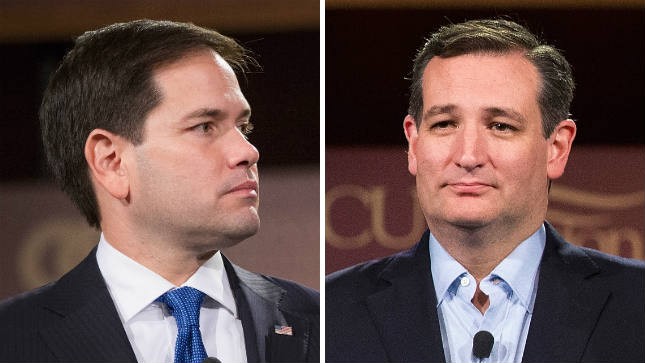
Two years before lambasting Sen. Ted Cruz (R-Texas) for his efforts to reform U.S. intelligence powers, Sen. Marco Rubio (R-Fla.) was sounding a more cautious note.
In a 2013 interview on Fox News, Rubio said concerns about the National Security Agency’s collection of data were legitimate.
“I wouldn’t dismiss these concerns offhand,” Rubio told Fox News’s Neil Cavuto.
“If you’re back home and you all of a sudden realize that the government has the capability and in fact is gathering information on every phone call made in America, you’re concerned about how that could be used at some point in the future — not just by the government but by individuals working for the government and by somebody who all of a sudden in the future may decide to politically target people,” Rubio added.
“That’s a legitimate concern.
"I think what we're struggling with as a country is how to protect Americans and also protect Americans, but also protect their individual liberties and their privacy expectations,” he added. “It's not a trivial issue. And it's an important one for us to try to balance, and we just haven't worked it out yet.”
"I think what we're struggling with as a country is how to protect Americans and also protect Americans, but also protect their individual liberties and their privacy expectations,” he added. “It's not a trivial issue. And it's an important one for us to try to balance, and we just haven't worked it out yet.”
Despite the note of caution, the Republican presidential candidate's comments about the National Security Agency (NSA) were largely supportive of the agency’s programs.
In the 2013 interview, Rubio called the spy agency’s controversial programs “essential and important” and claimed that they have helped to “foil attacks in the past and will do so again in the future.”
“We know that terrorists use technology to coordinate,” Rubio said. “If Osama bin Laden was calling someone in the United States, we would want to know that because I promise you his wasn't his stockbroker he was calling.”
Still, they appeared to be moderate compared to his recent rhetoric, which has been much more condemnatory of Cruz and Sen. Rand Paul (R-Ky.) for their efforts to roll back the NSA’s bulk collection of Americans’ phone records. Those reforms went into effect this weekend, ending one of the most controversial programs revealed by Edward Snowden in 2013.
“At least two of my colleagues in the Senate aspiring to be president — Sen. Cruz in particular — have voted to weaken the U.S. intelligence program,” Rubio said in November. “The weakening of our intelligence gathering capabilities leaves America vulnerable, and that is exactly what’s happened.”
Cruz’s push for NSA reforms appears to be a vulnerability in the aftermath of last month’s deadly attacks in Paris, during which a handful of men linked to the Islamic State in Iraq and Syria (ISIS) killed 130 people across the French capital.
Both Rubio and Cruz have been on the rise in the race for the GOP presidential nomination — though many see them as taking up different lanes in the contest.
Cruz, who has avoided criticizing the two candidates who have led much of the race, Donald Trump and Ben Carson, is running as an anti-establishment candidate and hopes to gain if Trump and Carson fade.
He is now surging in Iowa, where recent polls show him passing Carson and trailing only Trump.
Rubio is seen by many observers as a candidate who could win GOP establishment support, though some also believe he could win over conservatives.
He has surpassed former Florida Gov. Jeb Bush in several polls.
- Publish my comments...
- 0 Comments
